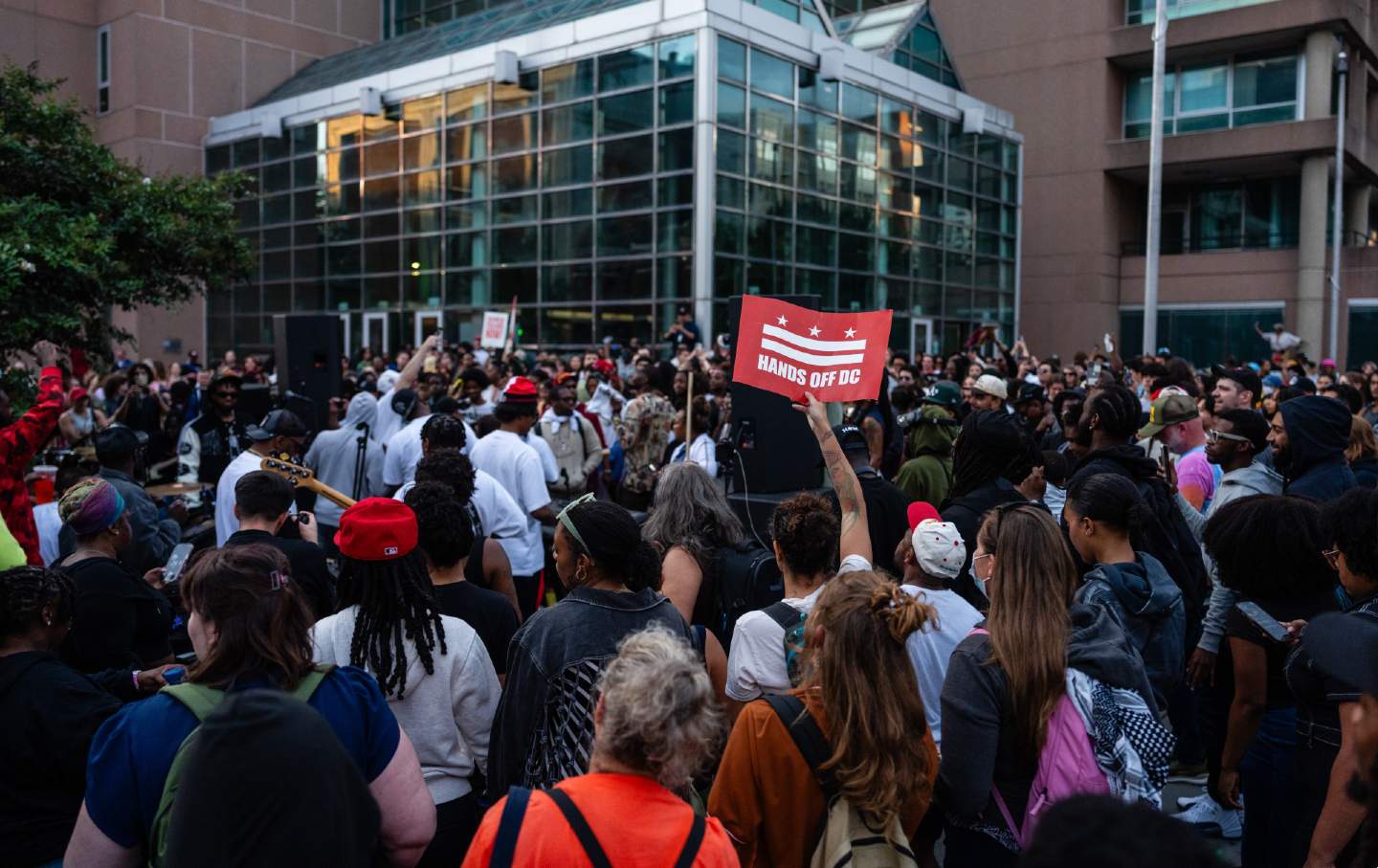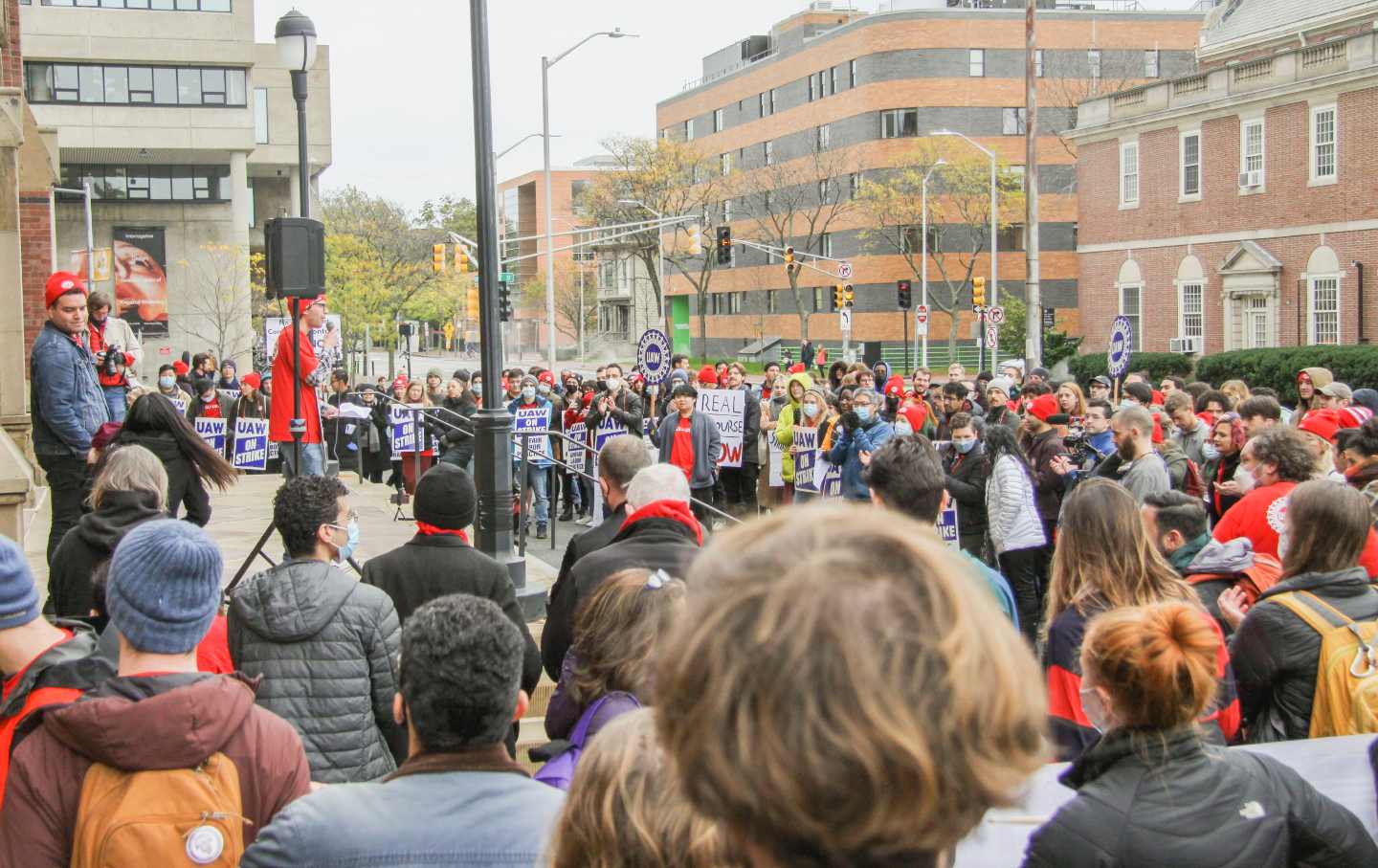Letters From the July/August 2025 Issue
The radical Self… In defense of Andrea Dworkin and Catharine MacKinnon (online only)… George Foreman in a new light (online only)… Elon Musk’s apartheid influences (online only)…
The Radical Self
Re “Trauma’s New Look,” by Jess McAllen [May 2025]: One of McAllen’s central critiques of internal family systems therapy is the lack of research behind it. It’s important to note that cognitive behavioral therapy, now widely accepted as an evidence-based treatment, took 20 to 30 years to develop a robust track record of empirical support. And CBT had significant structural advantages: It was developed within academic institutions, supported by large research grants and teams of graduate students. IFS, by contrast, evolved slowly and organically, often refined in informal settings like living rooms throughout the 1990s and 2000s, as early practitioners iteratively improved the model. Only in recent years has IFS gained the visibility and resources necessary to sponsor formal research. The early results of these studies have been promising, pointing to the need for continued investigation. From a clinical standpoint, I’ve witnessed the profound impact IFS can have—particularly for individuals with complex trauma histories. Since incorporating it into my practice, I’ve seen clients experience transformation in ways that are both effective and deeply meaningful. These outcomes have reinvigorated my work and offered renewed hope to clients for whom more traditional methods fell short.
While I value rigorous journalistic inquiry and a critical perspective, I urge The Nation to approach coverage of IFS with greater nuance—acknowledging both the legitimate need for further research and the growing number of clinicians and clients reporting significant benefits.
Brit Creelman, PhD
evanston, il
The writer is a licensed clinical psychologist in private practice.
Skepticism toward therapy trends is both understandable and essential, particularly as models like internal family systems grow in popularity and become packaged into high-cost trainings, retreats, and influencer-led brands. However, labeling the model itself or those who practice it as exploitative misses a deeper point. In fact, this critique risks exploiting the very individuals who’ve found in IFS a source of healing after being failed by other therapy models or individuals.
IFS is about cultivating inner harmony by connecting with Self, an innate state characterized by compassion, clarity, calm, and confidence. This idea isn’t unique to IFS, as similar concepts can be found in dialectical behavior therapy’s “wise mind” or in mindfulness practices. What sets IFS apart is its radical focus on consent. Nothing is forced. Parts only speak when they’re ready, and even “resistant” parts are treated with care and respect. In a society that often emphasizes intellectualizing or suppressing pain, IFS offers a gentler approach: What if even our avoidance deserves to be acknowledged?
Critique of commercialization and accessibility is valid and necessary. But many people turn to IFS not because it’s trendy, but because they’ve been failed by systems shaped by racism, capitalism, and medicalization. For them, IFS isn’t about luxury. It’s a lifeline, a tool for reclaiming internal space and healing.
Steven Coletti
brookline, ma
The writer is a licensed independent clinical social worker in private practice.
Internal family systems therapy helps people tune into qualities of Self, like curiosity and compassion. Good journalism emphasizes curiosity, too. Yet McAllen’s article instead demonstrates reflexive cynicism and factual indifference in its depiction of IFS and its founder, Dick Schwartz. It reflects a pervasive societal attitude of contempt toward those with whom we differ, which has led us to a very bad place. The times challenge us all, The Nation included, to rise above that impulse.
I write as a therapist who has practiced for 40 years, beginning in psychoanalysis and then adding trauma techniques, including IFS, in the early 2000s. I have seen firsthand how IFS helps people address deep-seated patterns, even after years of disappointment in other therapies.
McAllen reports on therapeutic successes but fails to take them seriously. Instead, she faults IFS for systemic issues within psychotherapy, including its cost, the limitations of clinical research, the expense of advanced training—even the excesses of social media! Oddly, she says nothing about how the IFS community addresses these issues.
Likewise, she dismisses current attention to trauma—it’s “become hot as of late”—as if popular interest implies deceit or fabrication. Given that the reality and impact of abuse have only recently gained broad acceptance, this interest seems more an overdue correction to historical injustices. She criticizes Schwartz’s focus on trauma as mere marketing, apparently unable to square his success with a genuine desire to ease suffering.
Jarring inconsistencies pepper the article. McAllen bemoans the difficulty of finding good, affordable therapists, cites a 20,000-strong waiting list of therapists wanting IFS training—and accuses IFS of a pyramid scheme in training new trainers. Huh? She reproaches IFS for blaming patients, then suggests that trauma allows people to evade blame.
Quite the opposite. IFS helps many people relate to parts of themselves that feel unlovable, unworthy, or just plain bad. It frees them to acknowledge the pain they have suffered and its effects, and it allows them to treat themselves and others with greater respect, compassion, and responsibility. Isn’t that what therapy should do? Isn’t that the society we want?
vivian dent, phd
oakland, ca
The writer is a licensed clinical psychologist in private practice.
In Defense of Dworkin and MacKinnon
As a millennial admirer of the 1970s’ US women’s liberation movement, I appreciated Zoe Dubno’s reflection on Shulamith Firestone’s fiction [“Tender, Compassionate, Crushing: The Fiction of Shulamith Firestone,” TheNation.com, May 1, 2025]. But the characterization of fellow second-wave feminists Andrea Dworkin and Catharine MacKinnon as “‘gender-critical’ TERFs” is wrong. Dworkin’s and MacKinnon’s stances on sex and pornography certainly provoke a range of strong reactions among feminists. But it is simply untrue that they evinced anti-trans bigotry. In fact, they did the opposite. (See: “Andrea Dworkin Was a Trans Ally,” by her former partner John Stoltenberg, Boston Review, April 8, 2020, and “A Feminist Defense of Transgender Sex Equality Rights,” by Catharine MacKinnon, Yale Journal of Law and Feminism, 2023.) To claim otherwise is unfair and reflective of the popular tendency to broadly reduce 1970s feminists to a reactionary monolith.
What would Shulamith Firestone say?
Haley Kossek
boston, ma
Foreman in a New Light
I’d like to thank Dave Zirin for his remembrance of George Foreman [“The Time George Foreman Sang Me Some Dylan,” TheNation.com, March 24, 2025]. I was one of the “Harvard Shaggies,” as we on the ’68 Olympic eight-oared crew were called by right-wing sports columnists offended by six white Olympians who dared to write a press release and hold a press conference alongside Harry Edwards in support of the Olympic Project for Human Rights. I never thought to ask Tommie [Smith] or John [Carlos] what they thought about Foreman’s flag-waving; I just took it at face value, as a rebuke of Tommie, John, and the OPHR. So I really appreciate the depth of Zirin’s article and the way it’s changed my opinion of Foreman’s actions.
Scott Steketee
philadelphia, pa
Musk’s Apartheid Influences
Re “Elon Musk’s Vision Is Coming Into Focus—and It Looks a Lot Like Neo-Apartheid,” by Elie Mystal [TheNation.com, February 13, 2025]: I would like to compliment the author of the piece. Very few of the articles I am seeing about Elon Musk’s South African influences are this well-researched. I would recommend that readers also look at the Natives Land Act of 1913. This is the piece of South African legislation that most reminds me of what Musk and Donald Trump are currently doing in the United States. It pushed Black South Africans into wage labour, by taking away their rights to land and ability to sustain themselves through agriculture. Taking away American social security systems would, I think, have a similar effect on forcing people to accept low-paying jobs.
Sarah Truen
centurion, gauteng, south africa
Take a stand against Trump and support The Nation!
In this moment of crisis, we need a unified, progressive opposition to Donald Trump.
We’re starting to see one take shape in the streets and at ballot boxes across the country: from New York City mayoral candidate Zohran Mamdani’s campaign focused on affordability, to communities protecting their neighbors from ICE, to the senators opposing arms shipments to Israel.
The Democratic Party has an urgent choice to make: Will it embrace a politics that is principled and popular, or will it continue to insist on losing elections with the out-of-touch elites and consultants that got us here?
At The Nation, we know which side we’re on. Every day, we make the case for a more democratic and equal world by championing progressive leaders, lifting up movements fighting for justice, and exposing the oligarchs and corporations profiting at the expense of us all. Our independent journalism informs and empowers progressives across the country and helps bring this politics to new readers ready to join the fight.
We need your help to continue this work. Will you donate to support The Nation’s independent journalism? Every contribution goes to our award-winning reporting, analysis, and commentary.
Thank you for helping us take on Trump and build the just society we know is possible.
Sincerely,
Bhaskar Sunkara
President, The Nation








